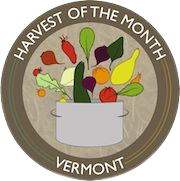Laughing All the Way - at Laughing Child Farm
Doming hills frame a picturesque slice of a farmer's heaven. Fertile soil carpets the banks of the Mettawee River, where the Hughes-Muse family farm thrives. In the steady rain, waterlogged sheep climb a neighboring hill, seeking a better view of the resting fields of Laughing Child Farm in Pawlet, Vermont.
Tucked away, out of the weather, Timothy Hughes-Muse and his family are hard at work sorting and processing stacks upon stacks of sweet potatoes.“Thanksgiving is our Super Bowl,” he shares, smoothly assembling a flattened box to be filled with bright orange sweet potatoes. “It's our busiest weekend.”
His daughters pack cubed sweet potatoes to be weighed, boxed, and shipped to Thanksgiving tables across the state. Stacks line the walls with this year's harvest as Ray Wylie Hubbard’s “Snake Farm” sets the tempo from a speaker in the corner.
“We grow Beauregard and Covington,” Tim says, lifting the lid on a box of forearm-sized, smooth-skinned gems. “Covington tends to be a little silkier when you puree or mash them,” he explains. “Beauregards, on the other hand, hold up better in a stew—they keep their structure. But they’re both about the same sweetness.”
On a sweet potato farm, hard work is the name of the game.
“Our philosophy is simple: we gotta do the work,” says Tim, reflecting on the year. “We can make it miserable, or we can enjoy it.” And as a family operation, enjoyment is evident in the perpetual smiles of everyone in the room.
“Sweet potatoes are actually really easy to grow,” Tim says, humbly brushing past his meticulous care for the soil and the arduous task of laying black plastic to make Vermont’s climate more hospitable to this traditionally southern crop. “But the harvest is very delicate and labor-intensive.”
It all starts once the lush green vines have nearly consumed the entire field.
First, the vines must be snapped off, one by one, by strong backs hunched over miles of raised beds. “It’s a very physically taxing thing, and that keeps most people out of it.” Only then can the fruits of their labor be unearthed.
It takes a gentle hand not to damage the fragile skin of a sweet potato. Each beautiful specimen is dug up by hand—a task suited only to the truly dedicated and patient.
Another reason more farms don’t grow sweet potatoes is that their storage needs don’t align with traditional infrastructure for diversified vegetables. “Most everything else—potatoes, eggplant, lettuce—wants to be kept cold,” Tim explains. “But sweet potatoes are different. They like the same temperatures we like for the most part.”
Unlike most crops, sweet potatoes do better when stored warm, ideally at 55–60 degrees.
This difference can complicate things for farms already set up for cold storage, but it’s an advantage for Laughing Child Farm. “Ours are never refrigerated,” Tim says. “They stay pretty fresh.”
By handling storage and delivery themselves, the Hughes-Muse family ensures their sweet potatoes arrive in peak condition, both nutritionally and in terms of flavor.
This maintains the potatoes’ quality but also keeps them closer to home. It’s part of the farm’s commitment to the local community.
“When you buy sweet potatoes at the Brattleboro Food Co-op, for example,” Tim explains, “the store’s making money, the farmer’s making money, and all the services that farmer’s buying are coming right back to the local community.”
That same sense of interconnectedness extends to the farm’s relationship with the land.
For the Hughes-Muse family, farming is an agricultural stewardship; a responsibility to care for the soil and ensure it remains healthy and productive. “We only have access to this land because of programs the state of Vermont offers,” Tim shares. “When we first started, we didn’t have any resources. We were only able to begin farming through the help of our neighbors.”
The only thing sweeter than the endearing origins of this beautiful family farm is the organic bounty that they bring in each year.
“You can cover them with marshmallows and brown sugar if you want, or you can just eat them whole and healthy.” Tim shares with a grin.
Much like their crop, the Hughes-Muse family’s approach to farming is rooted in hard work, gratitude, and above all, joy.
“It’s a choice that we make—to try to do it with a happy heart,” Tim reflects.
At Laughing Child Farm, that choice is evident in every sweet potato they grow, in the care they give to the soil, and in the laughter that fills the room, even on the busiest days of the year.
Written by Devan Monette















